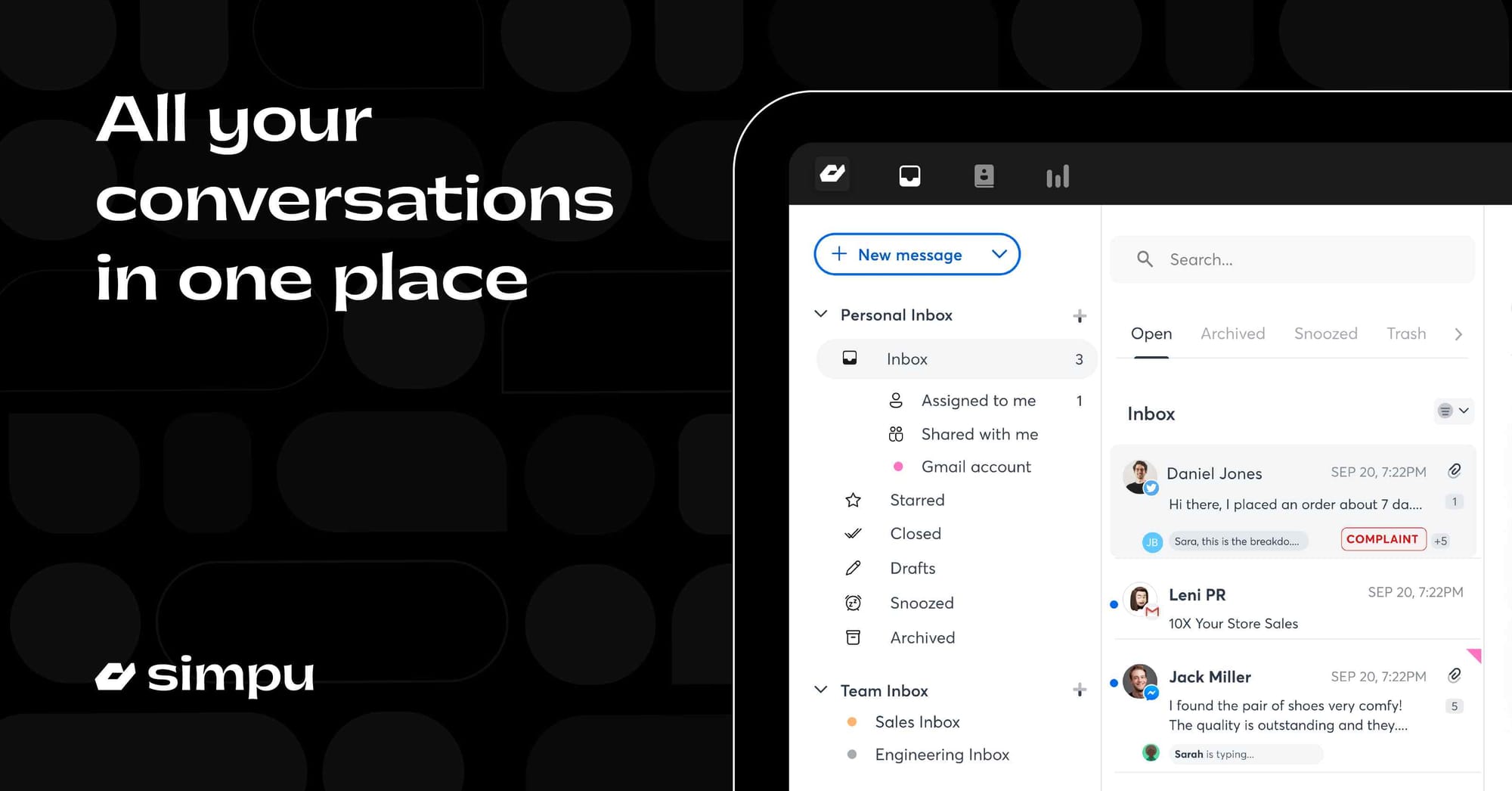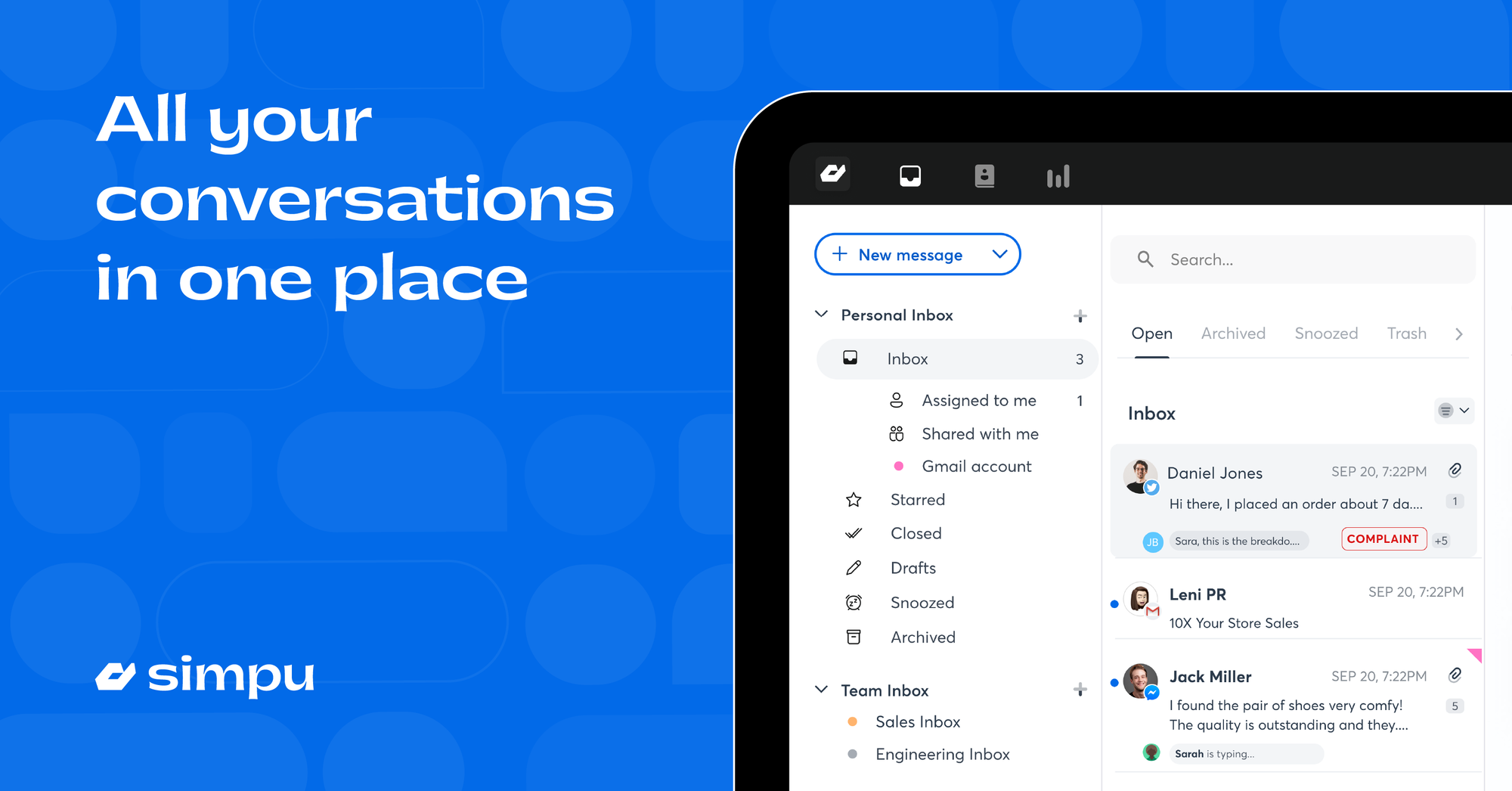A dedicated business phone number provides a reliable channel for customers to connect with your brand.
While it may seem like a simple detail, having a business phone number is essential for establishing professionalism and credibility in the eyes of your clients.
It not only enhances your professional image but also builds customer trust. Potential clients get to know that you are serious about your business and accessible when they need assistance.
Moreover, it allows for better call management, ensuring that inquiries are handled efficiently and effectively.
Whether you're a startup or an established company, investing in a business phone number is a step toward building lasting relationships with your customers and achieving long-term success.

Inbox
Connect all your communication channels - email, SMS, Whatsapp, Instagram, Messenger, and Live Chat to one inbox.
Choosing the right type of business phone numbers.
When selecting a business phone number, several factors must be considered, including budget, location, and the desired image.
Evaluate the costs associated with different types of phone services. Landlines often have higher installation and maintenance fees, while VoIP and virtual numbers can be more economical.
Consider whether your business operates locally or nationally. Local numbers can enhance community presence, whereas toll-free numbers are suitable for businesses with a broader reach.
A toll-free number can convey professionalism and accessibility, while a local number may foster trust within the community.
Traditional landline
Pros:
- Reliability: Landlines are less susceptible to outages caused by power failures or internet issues.
- Call Quality: They typically provide clear audio quality due to their established infrastructure.
- Emergency Services: Landlines allow for precise location tracking during emergency calls.
Cons:
- Cost: Higher monthly fees and installation costs compared to VoIP options.
- Limited Features: Additional features like call forwarding or voicemail may require expensive hardware.
- Inflexibility: Fixed locations make them less suitable for remote work environments.
Virtual phone number
Pros:
- Flexibility: Can be used from any device with internet access, allowing for remote work capabilities.
- Cost-Effective: Generally lower monthly fees than traditional landlines.
- Multiple Features: Often includes features like call forwarding, voicemail-to-email, and SMS capabilities without additional hardware costs.
Cons:
- Dependence on Internet: Requires a stable internet connection; service can be disrupted during outages.
- Perceived Legitimacy: Some customers may view virtual numbers as less professional than traditional landlines or toll-free numbers.
Toll-free number
Pros:
- Accessibility: Customers can call without incurring charges, which can increase call volume.
- Professional Image: Conveys a sense of credibility and trustworthiness, especially for larger businesses.
- Nationwide Reach: Ideal for businesses serving customers across multiple regions without local limitations.
Cons:
- Costly Setup and Maintenance: Initial setup can be expensive, and ongoing costs may exceed those of local numbers.
- Limited Local Presence: May not resonate as well with local customers who prefer familiar area codes.
Local number
Pros:
- Community Connection: Establishes a local presence that can foster trust among community members.
- Lower Costs: Generally more affordable than toll-free numbers and easier to set up than landlines.
- Simplicity in Marketing: Easier for local customers to remember and recognize.
Cons:
- Limited Reachability: Primarily serves a specific geographic area, which may hinder growth in broader markets.
- Perception Issues: May be perceived as less professional compared to toll-free numbers, particularly for national businesses.
Steps to get a business phone number
Step 1: Determine your business needs
Understand how large your business is and the specific needs of your industry. For example, a small local business may benefit from a local number, while an e-commerce platform might require a toll-free number for broader reach.
Consider how many calls you expect to handle daily. High call volumes may necessitate features like call routing or voicemail systems.
Based on your business goals, decide whether you need a local number, toll-free number, or VoIP service. Local numbers can enhance community trust, while toll-free numbers provide national accessibility.
Step 2: Choose a provider
Research different service providers such as telecom companies, VoIP providers, and cloud-based services.
Each offers varying features and pricing structures. Ensure the provider can grow with your business needs.
Step 3: Select a plan
Choose between various pricing plans such as pay-per-minute or unlimited calling options. Consider what aligns best with your expected usage.
Look for plans that offer extra features like call forwarding, voicemail, auto-attendant systems, integration with existing communication tools.
Step 4: Set up your number
Follow the provider's process to set up your new business phone number. This includes account activation and selecting your desired phone number type (local, toll-free, etc.).
Ensure that your new phone system integrates smoothly with any existing communication systems you have in place. This may involve configuring VoIP systems or setting up IP phones.
Once set up, update your website, social media profiles, and any business listings with your new phone number to ensure customers can easily reach you.

Shared Inbox
Connect all your communication channels - email, SMS, Whatsapp, Instagram, Messenger, and Live Chat to one inbox.
Key features to consider when getting a business phone number
1. Sharing number with team
Ensure the system allows for messages to be directed to the appropriate department or mobile device.
This feature helps streamline communication and ensures that customer inquiries are handled promptly and efficiently, enhancing overall customer satisfaction
2. Automated messages
Automated messaging systems enable businesses to send responses to customers even when the business is closed.
This feature can include automated replies or information about business hours, which keeps customers informed and engaged outside standard operating hours.
3. Auto-Attendant/IVR
An auto-attendant or Interactive Voice Response (IVR) system can manage incoming calls by directing them to the right department without needing a live receptionist.
This feature improves efficiency and enhances your business's professional image by providing a structured call-handling process.
4. Analytics
Advanced analytics tools allow businesses to monitor customer service performance and analyze customer behaviour based on call types and message interactions.
This data can provide valuable insights into customer preferences and help improve service delivery over time.
5. Scalability
Choose a phone service that allows for easy scalability, enabling you to add more numbers or features as your business grows.
This flexibility is crucial for adapting to increasing call volumes or expanding into new markets without significant disruptions.
Benefits of having a business phone number
1. Professional image
A business phone number establishes a clear and professional line of communication for customers.
This separation from personal numbers conveys seriousness and commitment, enhancing your brand's image in the eyes of clients and partners.
2. Customer trust
A dedicated business number, particularly a local one, fosters customer trust. It signals that your business is established and accessible, making customers more likely to engage with you.
This trust is essential for building long-term relationships and encouraging repeat business.
3. Better call management
You can better manage calls and messages by separating personal and business communications.
This organization helps ensure that important business inquiries are not missed and allows for more focused attention on customer needs without the distractions of personal calls.
4. Improved customer service
A business phone number often comes with features like call routing and voicemail services, ensuring that all calls are handled efficiently.
Customers can reach the right department quickly, and voicemail systems allow for timely follow-ups, enhancing overall customer satisfaction.

Shared Inbox
Connect all your communication channels - email, SMS, Whatsapp, Instagram, Messenger, and Live Chat to one inbox.







